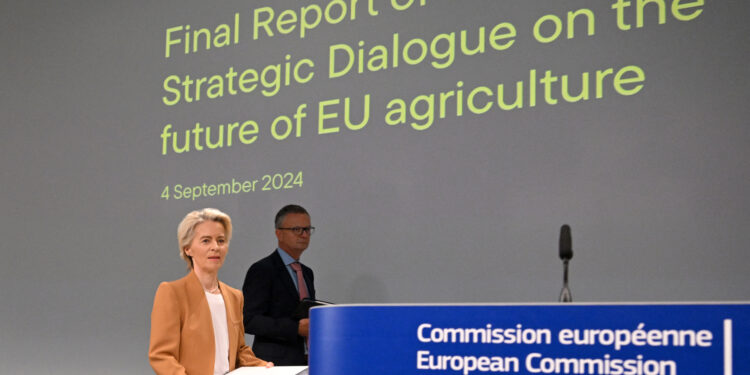Brussels – The European Commission takes steps forward for agriculture, officially establishing the European Board on Agriculture and Food (EBAF), thus taking up one of the recommendations of the final report of the Strategic Dialogue on the future of agriculture.
The new Commissioner for Food and Agriculture, Christophe Hansen, will chair the council, which aims to create a multi-participatory reality by engaging the Commission with stakeholders from the food supply chain and civil society. “Agriculture is at the heart of our Europe’s future. Today, we carry forward the energy of the Strategic Dialogue on the Future of EU Agriculture to build trust and bring people together,” said President von der Leyen.
The purpose will be to provide high-level advice to the European executive following up on the report of the Strategic Dialogue on the Future of EU Agriculture and contributing to the work on the vision for Agriculture and Food. Von der Leyen had promised that within the first 100 days of the new Commission’s term, it would provide answers, and it doesn’t seem to want to waste time.
The board has a five-year mandate and should meet two to six times a year, except for special meetings convened by Commissioner Hansen for urgent advice. It will encourage dialogue and exchange of experience among its members, focusing on the coherence and synergy of Union policies and their alignment with private sector initiatives.
It will comprise a maximum of thirty organizations representing three categories of stakeholders: the farming community, other actors in the food supply chain, and civil society, including in areas such as environment and climate, animal welfare, or consumer issues. Becoming a member requires applying to the Commission by January 8, 2025, with efforts made to have a balanced representation of these three categories of stakeholders.
“I want the European Board on Agriculture and Food to embody this new culture of cooperation and dialogue, not only between stakeholders but also towards and with the European Commission,” Hansen said. “The Strategic Dialogue on the Future of Agriculture demonstrated that representatives with apparently diverging interests could find a common ground,” he continues.
Members will be required to have a high level of expertise, and the organizations who apply for membership should demonstrate the broadest relevant competence and expertise in areas relevant to agriculture and food at the Union level and display the widest geographical representativeness across the Member States. They should also be registered in the Transparency Register. The Commission will evaluate all applications and aims to finalize the Board’s membership at the beginning of 2025. The Board’s first meeting will be convened immediately after.
Having convened the strategic dialogue with stakeholders on the future of agriculture in January 2024, von der Leyen is beginning to build a track to avoid being crushed by her openness to the key stakeholders of Europe’s agrifood sectors. With the new European Board on Agriculture and Food, it will be possible to have a team of experts and, at the same time, for the Commission to keep a close eye on the situation of European agriculture.
“We need to do more for our agriculture, and we will,” von der Leyen had said, paving the way for the future of the new college and Commissioner Hansen. Since Hansen had said at his hearing that he wanted to be a boot-on-the-ground commissioner, he will have a chance over the next five years to engage with the agricultural sector, which notoriously does not give much leeway to European politics.
English version by the Translation Service of Withub






